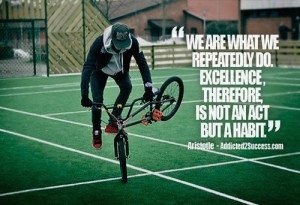Life
3 Lessons Cycling Has Taught Me About Being An Entrepreneur

I’ve been an athlete for just about as long as I can remember. While I spent most of my youth competing in one sport or another and my early adulthood staying fit in the gym, I never expected these disciplines to inform the career and business I would build later in life.
That all changed when a hunger for competition drove me to take part in a triathlon, which involves swimming, cycling, and running.
As my passion grew, particularly for cycling, I realized that the traits needed to be a successful cyclist are beneficial for entrepreneurs, too.
Biking Toward Better Entrepreneurship
Studies have shown that exercise can play a huge role in clearing your mind and helping you function better in general.
Stepping away from work to focus on a hobby can give you a new vantage point from which to find perspective, allowing the opportunity for innovation.
It also gives you the chance to meet new people. After all, you never know where you might encounter your next client, partner, or connection.
In addition to these more tangible benefits, a hobby such as cycling can teach you valuable lessons and have a direct influence on your performance in business.
1. Consistency is key
When I became a triathlete, I wanted to be the best right away, but I quickly discovered that it doesn’t happen overnight.
Achieving greatness takes years of consistent training, and you can only attain sufficient performance gains by maintaining focus over the long term.
This is equally true in business.
Everyone has a million-dollar idea, but the difference between those who succeed and those who fail boils down to who has the drive to put in consistent effort.
When you learn to celebrate the small victories and enjoy the journey, success is just a matter of patience.
“It’s not what we do once in a while that shapes our lives. It’s what we do consistently.” – Anthony Robbins
2. Be willing to struggle
After a few years of consistent training for triathlons, I reached a fairly competitive level, and a friend of mine whose performance was lacking decided to ask me for some training advice.
I sat down with him to review what he was doing.
Much to my surprise, I found out that he did a lot of low-intensity workouts.
When I asked him about his more challenging interval workouts, which are essential for effective training, he told me that he didn’t like doing them because they were “too hard.”
It didn’t take a rocket scientist to figure out why he was getting nowhere.
Most new entrepreneurs have no idea what they’re getting into, and they jump in thinking about the end goal, achieving success.
What they don’t expect are all of the challenges they’ll have to overcome.
Just because you’re struggling, it doesn’t mean you’re failing. In fact, the willingness to face a challenge head-on will determine whether you fail or succeed.
Like training on a bike, the biggest gains come when you’re willing to embrace the struggle.
3. Starting is half the battle
Over the years, I’ve tried a variety of triathlon training plans in an attempt to find the best one.
I’ve spent hours upon hours reading books, consulting with coaches, and even contacting some of the sport’s top professionals.
But after all of that research and effort, I’ve learned that nothing happens unless you just get on your bike and go.
Sometimes, athletes obsess over training plans so much that they never get to the actual training.

Early in my career, my brother and I got so caught up in the process of learning how to build a successful business that we ended up getting stuck.
Eventually, I went to an entrepreneur friend of mine for advice, and his words snapped me out of my lull.
He told me that at any point in time, you have a certain amount of information. If you want to be successful, you have to take what you know and take a step forward.
You might not have all the information you need, but you must take what you have and start.
You might not have the perfect plan, but you’ll move toward your goal faster by starting now rather than sitting still.
In the end, my point is simple:
A hobby like cycling gives you the chance to learn new lessons and can deliver surprising benefits to your business.
So take the time to get out of the office and go for a ride, swim, or do whatever else inspires you.
Life
Why Moving to a New City Can Change Your Mindset
Discover how moving to a new city boosts neuroplasticity, builds resilience, and reshapes your mindset

Relocation is always a challenge. Rebuilding and restarting your life requires you to step outside of your comfort zone. (more…)
Change Your Mindset
The Hidden Reason You Can’t Stay Consistent
If motivation keeps failing you, the real issue isn’t discipline. It’s the identity shaping your habits and long-term success.

Success often looks like a time-management problem. You buy a planner, set reminders, and hope that next week will be different. For a few days, it works. Then stress hits, motivation drops, and old patterns return. (more…)
Did You Know
How Skilled Migrants Are Building Successful Careers After Moving Countries
Behind every successful skilled migrant career is a mix of resilience, strategy, and navigating systems built for locals.

Moving to a new country for work is exciting, but it can also be unnerving. Skilled migrants leave behind familiar systems, networks, and support to pursue better job opportunities and a better future for their families. (more…)
-

 Business4 weeks ago
Business4 weeks agoWhy Entrepreneurs Should Care About AI Automation Testing
-

 Business4 weeks ago
Business4 weeks agoWhy Smart FMCG Entrepreneurs Outsource What They Can’t Automate
-

 Business3 weeks ago
Business3 weeks agoWhat Every Business Owner Should Know Before Investing in API Integration
-

 Did You Know4 weeks ago
Did You Know4 weeks agoThe SEO Traps Even Experienced Marketers Fall Into
-

 Business3 weeks ago
Business3 weeks agoWhy Smart Entrepreneurs Are Quietly Buying Gold and Silver
-

 Business2 weeks ago
Business2 weeks agoHow Smart Brands Use Instagram Data to Outperform Competitors
-

 Business3 weeks ago
Business3 weeks agoThe Paradox of Modern Work: Can Tech Make Us More Human?
-

 Business2 weeks ago
Business2 weeks agoHow AI Agents Can Quietly Expose Your Business to Serious Risk





























